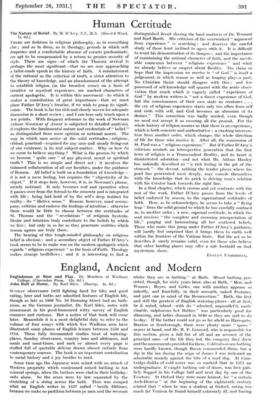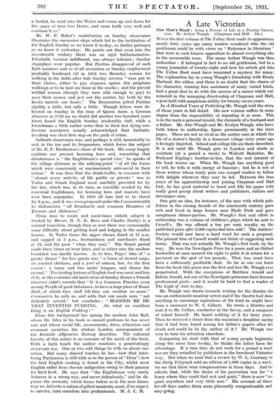England, Ancient and Modern
Englishmen at Rest and Play. By Members of 'Wadhain College. (Clarendon Press. 12s. 6d.) John Bull at Home. By Karl Silex. (Harrap. 8s. 6d.)
SUNDAY observance (still fighting hard for life) and. good eating, beer and baths are admitted features of English life, though as late as 1908 No. 10 Downing Street had no bath- room, as the German journalist, Dr. Karl Silex, notes with amazement in his good-humoured witty survey of English manners and customs. But a notice of that book will come later. Meanwhile it is a most delightful duty to refer to the volume of four essays with which five VVadham men have illustrated some phases of English leisure between 1558 and 1714. These fully documented studies treat of watering- places, Sunday observance, country inns and alehouses, and meals and meal-times, and each or almost every page is stuffed full of quotable deliciae drawn almost entirely from contemporary sources. The book is an important contribution to social history and a joy besides to read.
Some time ago the Japanese were seized with an attack of Western propriety which condemned mixed bathing in hot mineral springs, when the bathers were clad in their birthday- suits alone. So the sexes were by law separated by the stretching of a string across the bath. Thus was escaped what an English writer in _ 1557 called " bestly filthines, because we make no partition between ye men and the "weomen whilse they are in bathing " at Bath. Mixed bathing per- sisted, though, for sixty years later, also at Bath, " Men, and Women ; Boyes, and Girles, one with another appeare so nakedly, and fearefully, in their uncouth, naked Postures, and putt one in mind of the Resurrection." Bath, the first and still the greatest of English watering-places—all at first, be it noted, inland—with its " admired, unparallel'd, medi- cinable, sulphurous hot Bathes " was particularly good for slimming, and ladies slimmed in 1040 as they are said to do to-day. If the bather could not go so far afield as Harrogate, Buxton or Scarborough, there were plenty more " spaws " nearer at hand, and Mr. R. F. Lennard, who is responsible for this section, gives a full list of all and an account of the principal ones—of the life they led, the company they drew and the amusements provided for them. Cold tubs or sea-bathing were hardly known, though Bacon commended them, but a dip in the sea during the reign of James I was reckoned an admirable remedy against the bite of a mad dog. At Cam- bridge dislike of cold water was so marked that in 1571 an undergraduate, if caught bathing out of doors, was first pub- licly flogged in his College hall and next day by one of the Proctors. At Oxford they were more lenient, for " a certain Arch-Deacon " at the beginning of the eighteenth century related that " when he was a student at Oxford, eating too much fat Venison he found himself extremely ill, and fearing a Surfeit, he went into the Water and swam up and down for the space of near two Hours, and came forth very well and continue'd so."
Mr. W. P. Baker's contribution on Sunday observance illustrates the successive steps which led to the institution of the English Sunday as we know it to-day, or (better perhaps) as we knew it yesterday. He points out that even into the seventeenth century there was no rigid Sabbatarianism. Elizabeth, because indifferent, was always tolerant ; Sunday stageplays were popular. But Puritan disapproval of such light manners and so of all recreation or Sunday employment gradually hardened, till in 1652 two Barnsley women for walking in the fields after both Sunday services "were put to their choice, either to pay sixpence apiece (for prophane walking) or to be laid one hour in the stocks ; and the pievish Willful! women (though they were able enough to pay) to save their money and jest out the matter, lay both by the heeles merrily one houre." The Restoration jolted Puritan rigidity a little, but only a little. Though letters were de- livered on Sunday in the time of Queen Anne, a German observer in 1710 (as no doubt did another two hundred years later) found the English Sunday intolerably dull, while a Frenchman a little earlier notes that in their last dying con- fessions murderers usually acknowledged that Sabbath- breaking was their first step on the path of crime.
Sabbath observance was, and perhaps is still, lamentably to seek in the inn and its frequenters, which forms the subject of Mr. R. F. Bretherton's share of the book. His essay largely explains our present licensing laws and, remarking that drunkenness is " the Englishman's special vice," he speaks of the village alehouse as the rallying-point " of all the forces which were consciously or unconsciously anti-social in their action." It was thus that the drink-traffic, in common with almost every activity of life public or private " was in Tudor and Stuart England most carefully provided for by the law, which was, in its turn, as carefully evaded by the convivial Englishman, for licensing laws and imposts have ever been unpopular. In 1618 all inns had to be closed by 9 p.m., and it was even proposed under the Commonwealth to disfranchise " all Drunkards and common Haunters of Taverns and Alehouses."
From inns to meals and meal-times (which subject is treated by Messrs. R. N. K. Rees and Charles Fenby) is a natural transition, though then as now there was occasionally some difficulty about getting food and lodging in the smaller houses. In Tudor times the upper classes dined at 11 a.m. and supped at 5 p.m., husbandmen and merchants dined at 12, and the poor when they may." The Stuart period made these times an hour later, and in either case the modern breakfast was hardly known. As to fare, Pepys' idea of " a pretty dinner " for five guests was " a brace of stewed carps, six roasted chickens, and a jowl of salmon, hot, for the first course ; a tanzy and two nests' tongues, and cheese the second." The leading feature of English food was meat and lots of it; at the centuries-old institution of Sunday dinner a French observer (1697) records that "It is a Common Practice, even among People of good Substance, to have a huge piece of Roast Beef, of which they stuff till they can swallow no more." Carnassiers he calls us, and adds that our meals were " not delicately served," but concludes : " BLESSED BE RE THAT INVENTED PUDDING. Ah, what an excellent thing is an English Pudding ! "
From this background has sprung the modern John Bull, whom Dr. Silex in his book so named professes he has never met and whose social life, amusements, dress, education and economic anxieties the whilom London correspondent of the Deutsche Allgemeine Zeitung describes. The enforced brevity of this notice is no measure of the merit of the book. With a light touch the author combines a penetratingly
observant eye. One or two odd things he tells us about our- selves. But many shrewd touches he has—how that inter- fering Puritanism is still with us in the person of "Dora"; how the best English cooking is found in the City, whilst most English suffer from chronic indigestion owing to their passion
for fried food. He says that " the Englishman very rarely behaves in a wrong way, and never ridiculously," and he de- plores the necessity which looms before us in the near future that we, hitherto a nation of gifted amateurs, must, if we expect to survive, turn ourselves into professionals. M. J. C. M.



































 Previous page
Previous page